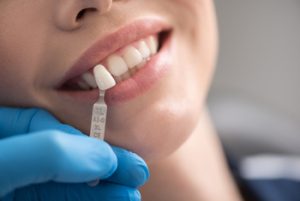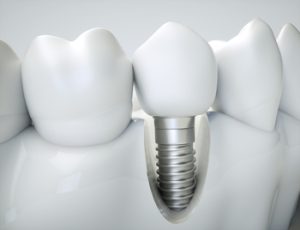Dental tourism is on the rise, and India is emerging as a preferred destination for those seeking affordable dental care. Imagine undergoing a dental implant procedure with views of the majestic Taj Mahal or the serene backwaters of Kerala as your backdrop! However, it’s essential to look beyond India’s rich cultural tapestry and vibrant landscapes and assess the more practical aspects, such as the qualifications of dental professionals and the standards of the clinics. While the lower dental implants cost India offers might be attractive, these financial savings should be carefully balanced with the importance of receiving high-quality care to ensure that your dental health is never compromised.
What Are Dental Implants?
Dental implants are synthetic structures that serve as replacements for the roots of missing teeth. Generally constructed from titanium, they come in several variations, such as endosteal implants that go directly into the jawbone, and subperiosteal implants positioned on the jawbone but beneath the gum tissue.
What Is the Cost of Dental Implants in India?
What Are the Advantages of Choosing Australia Over India for Dental Implant Treatments?
Superior Healthcare Standards
Australia is renowned for its high healthcare standards, which directly translate to the quality of dental implant procedures available. Australian dental clinics adhere to strict regulatory standards, ensuring that every aspect of the dental treatment process is monitored and executed with precision and care. This commitment to quality greatly reduces the risks associated with procedures and enhances the overall success rates of dental implant treatments.
Advanced Dental Technologies
In Australia, dental clinics are often equipped with the latest in dental technologies and equipment. This modern approach not only improves the accuracy of dental implant procedures but also enhances the comfort and experience of the patient during treatment.
Highly Qualified Dental Professionals
Australia’s dental professionals are required to undergo rigorous training and continuous education in order to practise. This ensures that every dentist performing dental implant procedures is highly skilled and up-to-date with the latest dental practices and technologies. The expertise of Australian dentists provides a significant advantage in terms of the reliability and safety of the dental treatments offered.
Comprehensive Post-Treatment Care
Post-treatment care is vital for dental implant success, and Australian dental clinics excel in this area. Follow-up appointments are standard practice, ensuring that any potential complications are identified and addressed promptly. This level of aftercare is often unmatched in dental tourism destinations like India, where distance and travel can make comprehensive follow-up more challenging.
Regulatory and Legal Protections
Patients receiving dental treatments in Australia benefit from robust regulatory and legal protections that are not as pronounced in many other countries, including India. These protections ensure that patients have recourse in the event of malpractice or complications arising from dental treatments. This adds an extra layer of security and peace of mind for patients choosing to undergo dental procedures in Australia.
Economic Considerations
While the initial dental implant cost may be higher in Australia compared to the cheaper dental implants available in India, the long-term value provided by Australian dental care is superior. Investing in dental treatments in Australia can often be more cost-effective in the long run, considering the reduced need for corrective procedures and the longevity of the treatments provided.
Choosing Australia for dental implant procedures offers numerous benefits that extend beyond the immediate allure of cheaper alternatives like dental tourism in India. From higher standards of care and advanced technologies to comprehensive legal protections and superior post-treatment support, the advantages are clear. Patients opting for dental care in Australia not only receive high-quality treatments but also enjoy greater peace of mind regarding the safety and success of their procedures.
How Does One Start the Process of Getting Dental Implants?
Booking the Initial Consultation
The journey towards obtaining dental implants starts with scheduling an initial consultation at a reputable dental clinic. This appointment is essential for the dental professional to assess the state of your oral health, specifically looking at any existing dental issues that might affect the implant process. This session typically includes a thorough examination, discussions on your health history, and diagnostic imaging like X-rays or 3D scans to assess bone structure and density.
Developing a Personalised Treatment Plan
Following the initial assessment, if you are considered a good candidate for implants, the next step involves formulating a detailed dental implant treatment plan. This plan will outline the specific steps of your dental implant procedure, including the timeline and the type of implants that will be used. This stage is crucial for setting realistic expectations and preparing you for the upcoming procedures.
Preparation Phase for Surgery
Preparation for the implant surgery might involve additional dental treatments depending on your oral health status. In situations where jawbone density is insufficient, bone grafting may be proposed to provide a robust base for the implants. This step is vital for maintaining the stability and long-term effectiveness of dental implants.
Conducting the Dental Implant Surgery
The core of this process is the implant surgery itself. Performed under appropriate anaesthesia, the procedure starts with the dentist making a precise incision in the gum to expose the jawbone. The next step involves the careful drilling of a hole where the dental implant—a titanium post—will be securely placed.
The Healing Process and Implant Integration
After placing the dental implant, the site is allowed to heal, a process known as osseointegration where the implant integrates with the natural bone. This critical phase can last several months, during which the titanium post fuses with the jawbone, forming a robust foundation for the new artificial tooth.
Attaching the Abutment and Prosthetic Installation
Upon verifying the completion of the healing process and the secure placement of the implant, an abutment is attached to the implant. This piece acts as a connector for the final prosthetic—usually a crown used to replace the missing tooth. Following the placement of the abutment, impressions of your mouth are taken to create a tooth crown that matches the shape and hue of your real teeth.
Completing the Implant Procedure
Embarking on dental implant surgery involves multiple carefully planned stages, from initial consultation through to the final placement of the crown. Each stage is crucial in ensuring that the overall treatment is successful and that the implants last for many years. Choosing a capable and professional dental professional is vital to achieving the best outcomes from dental implant surgery.
How Do Dental Implants Contribute to Improving Overall Health?
Supporting Nutritional Health Through Improved Chewing Function
Dental implants play a pivotal role in restoring the functionality of teeth, significantly impacting nutritional intake. Missing teeth or poorly fitted dentures can severely restrict the kinds of foods one can eat, often leading to the avoidance of hard or crunchy foods like fruits and vegetables, which are crucial for a balanced diet. Dental implants mimic natural teeth, enabling individuals to enjoy a diverse diet encompassing all food groups, ensuring they obtain essential nutrients vital for overall health.
Preventing Bone Loss and Maintaining Jaw Structure
One of the less-talked-about benefits of dental implants is their capacity to prevent jawbone deterioration. When natural teeth are lost, the bone that once supported them begins to deteriorate due to lack of stimulation. This can lead to noticeable changes in facial structure over time, potentially resulting in a prematurely aged appearance. Dental implants fuse with the jawbone, offering necessary stimulation to sustain bone density and support facial structure. This process, known as osseointegration, helps in preserving the jawbone and maintaining the natural shape of the face.
Enhancing Oral Health and Reducing Disease Risk
Dental implants have a substantial impact on oral health by lessening the risk of periodontal disease. Gaps created by missing teeth can trap food debris and bacteria, which may result in gum infections and, consequently, periodontal disease.
By filling these gaps, dental implants reduce the areas where harmful bacteria can accumulate. Furthermore, unlike dental bridges, implants do not require altering adjacent healthy teeth, which means that more of the natural teeth are preserved, reducing the risk of decay and periodontal diseases.
Contributing to Mental Health and Well-being
The psychological impact of dental implants can be profound. Missing teeth often lead to self-consciousness about one’s appearance, which can affect social interactions and lead to social isolation or depression. By restoring the appearance of natural teeth and improving smile aesthetics, dental implants can boost self-esteem and improve mental health. The ability to eat, speak, and smile without concern not only enhances social interactions but also contributes to greater overall well-being.
Improving Speech and Communication
Dental implants also have a noteworthy impact on one’s ability to speak clearly. Missing teeth can create noticeable gaps that alter speech patterns, making it difficult to pronounce specific words correctly. This can affect communication, which is vital in both personal and professional settings. By replacing missing teeth with implants, normal speech is often restored, allowing clearer and more effective communication.
Enhancing Comfort and Convenience
Unlike removable dentures that can move or slip within the mouth, dental implants are securely anchored in place. This stability eliminates the discomfort and inconvenience associated with dentures slipping or rubbing against the gums, which can cause sores and irritation. With dental implants, individuals can avoid the hassle of denture adhesives and the embarrassment of dentures slipping during speech or meals.
By addressing everything from nutritional intake and jawbone health to psychological well-being and speech clarity, dental implants provide comprehensive benefits that extend well beyond just dental health. They are a robust solution for replacing missing teeth and are instrumental in enhancing the quality of life and overall health of many individuals.
What Are the Recommended Methods for Maintaining Dental Implants?
Routine Cleaning and Oral Hygiene
Maintaining dental implants begins with effective daily oral hygiene. Preserving the integrity of the implant surface requires brushing your teeth twice daily with a delicate toothbrush and non-abrasive toothpaste. This helps in removing plaque without damaging the implant or irritating the surrounding gum tissue. Additionally, flossing at least once a day is essential, preferably with floss designed specifically for implants, to remove plaque and food particles from under the gum line and between the teeth.
Use of Interdental Brushes
Interdental brushes are a perfect tool for cleaning around dental implants, particularly in areas that are hard to reach with regular floss. These brushes help in removing debris from the sides of the implants and the abutments, where bacteria can accumulate and lead to infections if not properly cleaned. It’s important to choose a size that fits comfortably between your teeth and implants without causing discomfort.
Regular Dental Check-ups
Scheduling consistent visits to the dental clinic for professional cleanings and check-ups is vital for the longevity of dental implants. During these visits, a dental hygienist can perform professional cleaning that includes the use of tools designed to clean around implants and check for any signs of gum disease or implant loosening. These appointments also provide an opportunity for dentists to monitor the integrity of the implants and make any necessary adjustments to the care regimen.
Avoiding Harmful Habits
Certain habits can jeopardise the health of dental implants and should be avoided. Smoking, for example, can impair healing and negatively affect the osseointegration process. Similarly, chewing on hard objects such as ice, candy, or pencils can put excessive pressure on implants, potentially leading to damage. It is advisable to avoid these behaviours to ensure the durability and stability of the implants.
Managing Dietary Choices
While dental implants are designed to function like natural teeth, it is wise to manage dietary choices, especially soon after the implant procedure. Avoiding overly hard or sticky foods can help prevent undue stress on the new implants during the healing period. Once fully integrated, implants can handle most foods, but being cautious with extremely hard foods can prolong their life.
Addressing Bruxism
Bruxism, or teeth grinding, can pose a substantial risk to the longevity of dental implants. If you grind your teeth, it is important to discuss this with your dentist, who may recommend wearing a night guard to protect both the natural teeth and the implants. This guard helps to distribute the force exerted during grinding or clenching, thereby protecting the implants from potential damage.
Specialised Products for Implant Care
Utilising products specifically designed for implant care can further enhance the maintenance routine. These include special toothbrushes, flosses, and oral irrigators that are gentle on the implants and effective in cleaning hard-to-reach areas. Such products can help maintain optimal oral health and extend the life of your dental implants.
By adhering to these recommended methods for maintaining dental implants, patients can significantly improve the success rate and longevity of their treatment. Regular care, combined with professional oversight, ensures that dental implants continue to provide a functional and aesthetic solution for missing teeth.
Rethink Cost-Cutting When Opting for Dental Implants
A thorough evaluation of these critical aspects ensures that you make a well-rounded decision that does not compromise on quality for the sake of reduced expenses. While destinations like India promise economical options, the comprehensive care and stringent standards upheld in Australian dental practices often justify the investment, ensuring you receive superior care that aligns with your health needs.
If you’re contemplating dental implants or seeking more detailed advice about the dental implant procedure, please contact Casey Dentists, Aitkenvale (Townsville) Queensland, 4814, at 07 4801 7035. Book your consultation with our skilled professionals who are dedicated to guiding you through a safe and informed decision-making process for your dental health in Australia.
Note: Any surgical or invasive procedure carries risks. Before proceeding, you should seek a second opinion from an appropriately qualified health practitioner.
References:
https://www.ncbi.nlm.nih.gov/books/NBK470448/
https://www.forbes.com/health/body/dental-implants-guide/



